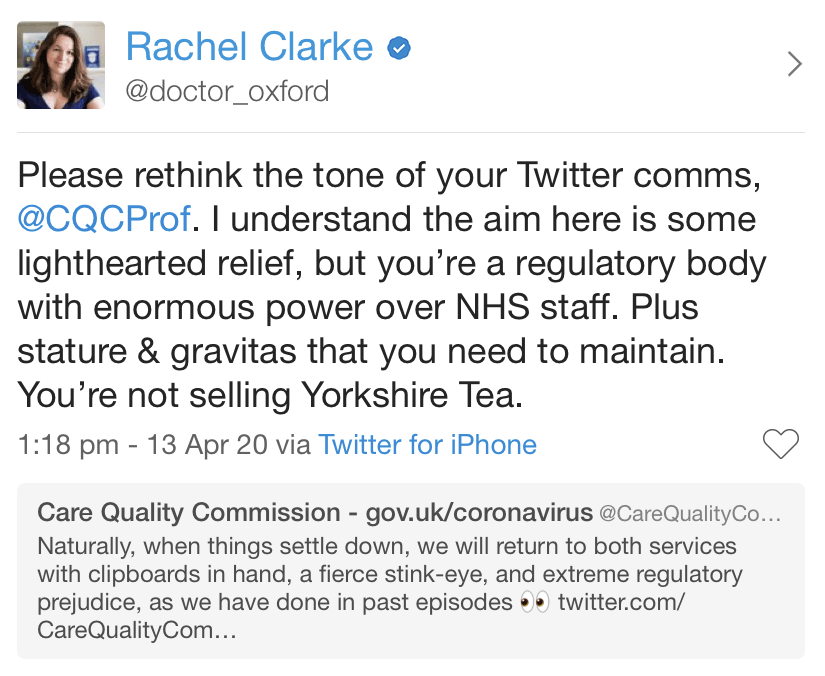Back when London’s lockdown was beginning, writer and journalist Rhymer Rigby tweeted that his daughter described his job as ‘the opposite of a key worker’. Well, quite. It feels odd to take the coronavirus on as ‘content’ with tips and tricks on other ways to write about ‘unprecedented times’. And yet it feels just as odd not to mention it all together.
There are plenty of general tips on writing coronavirus comms around now, so we won’t add to those. But, briefly, we wanted to post about how hard it is to get your tone right at the best of times – and when it’s the worst of times it becomes an even tougher job.
Here’s a (now deleted) tweet from the Care Quality Commission (CQC) – the independent organisation that regulates hospitals, doctors and care homes in the UK. (CQC’s original tweet is underneath Dr Clarke’s reply here):

To get you up to speed, two of the UK’s longest-running BBC hospital dramas/soaps, Holby City and Casualty, gave their sets’ (working) ventilators to the NHS. For the CQC’s writer (a tricky job right now) it was probably a rare moment of light relief: TV show steps in, so let’s make a witty aside about upgrading the fictional hospitals’ ratings to outstanding, and gently mock how the CQC’s own inspectors are portrayed on TV.
Except.
Two things: 1) these are far from normal times, especially where the NHS is concerned and 2) the CQC is a regulator. Regulators have an important job to do and, for most people it follows that they should sound serious. When we worked for Ofqual, the exams and qualifications’ regulator, there was a common view in the organisation that they should sound formal – sometimes even knottily so – because they’re a statutory body.
The reaction to the CQC’s tweet about BBC dramas showed, perhaps unsurprisingly, that a ‘light hearted’ regulator, especially of the NHS, especially now, isn’t what people want. ‘Stature and gravitas’ please, replies Dr Clarke (who is also an author and excellent writer), ending with ‘you’re not selling Yorkshire Tea’. While another person on Twitter suggested the CQC’s writer ‘go and work for Apple’ if they think they’re so cool. ‘Banter’, said someone else, needs to stop.
It follows that formal = serious and good. Chat = silly marketing fluff. But chat isn’t something we’d recommend for any organisation, whatever their role. The companies that get their tone right on social don’t do it either. Yorkshire Tea might be an easy put-down, but actually they have good form in dealing with people on social.
When chancellor Rishi Sunak shared a photo on Twitter of himself making tea for his team next to a giant pack of Yorkshire Tea, it caused a stir. People have a lot of love for both the brew and the area, and lots of tweeters were angry that the company was making some sort of political broadcast (with some mistakenly thinking it was a sponsored post). Un-twittingly at the centre of an actual storm in an actual tea cup, Yorkshire Tea had a lot of cross words to deal with.
Tonally, their reply is spot on. It’s restrained, it’s clear and calls out the angry tweeter’s hysteria in a short and sharp way. ‘Sue, you’re shouting at tea’ became a meme in its own right. A designer in Brixton even made it into a T-shirt.
So while we see where the CQC’s comment was coming from (it’s telly, therefore I can make a joke at a time when there’s not much else to smile about), the broader picture and their role in the NHS means their tone hit a wrong note. And doctors were quick to tell them so. But that doesn’t mean they need to flip from ‘light-hearted’ to ‘formal and anonymous’. The most emotionally intelligent writing we’re seeing at the moment is neither. If we’re honest, we probably crave direction and clarity from people like the CQC right now. Whereas humility and a bit of ‘I haven’t the foggiest what’s the best way through this either’ probably feels about right for everyone else.
Read our guides to writing content and social.
